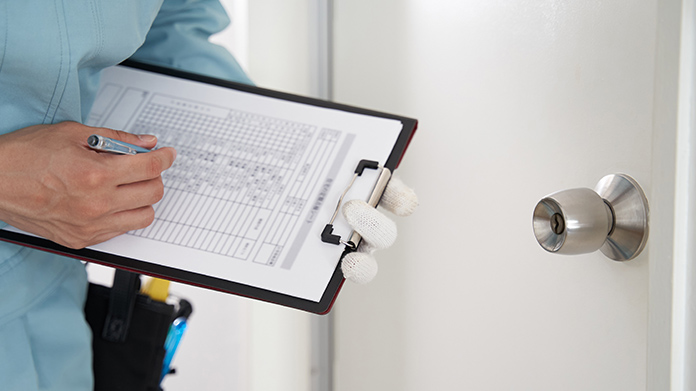Do I Need an LLC for My Home Inspection Business?
Starting a limited liability company (LLC) for your home inspection business can provide several benefits.
Most importantly, an LLC structure offers limited liability to its owners, which can protect their personal assets from lawsuits and creditors.
For a home inspection business, lawsuits can arise from things like failing to identify and disclose serious issues within a commercial property, indemnity claims, or breach of contract disputes.
LLCs are also affordable, highly flexible (from a tax point-of-view), and can make your home inspection business seem more credible

Interested in getting started? More than 84% of our readers form their LLC through a specialized LLC formation service in order to save time and avoid potential penalties.

Should I Start an LLC for a Home Inspection Business?
LLCs are a simple and inexpensive way to protect your personal assets and save money on taxes.
You should start an LLC when there’s any risk involved in your business and/or when your business could benefit from tax options and increased credibility.
LLC Benefits for a Home Inspection Business
By starting an LLC for your home inspection business, you can:
- Protect your savings, car, and house with limited liability protection
- Have more tax benefits and options
- Increase your business’s credibility
Limited Liability Protection
LLCs provide limited liability protection. This means your personal assets (e.g., car, house, bank account) are protected in the event your business is sued or if it defaults on a debt.
Home inspection businesses will benefit from liability protection because of the relatively high risk involved with inspecting real estate properties.
Example 1: A customer sues your business for negligence on the basis that it failed to notice a number of important issues with their property, such as its outdated electrical system. Limited liability would shield your personal assets from the court seizing them in order to pay this customer the damages it feels they are owed.
Example 2: After your home inspection business provided a report that knowingly overlooked several of the property’s serious defects, the homeowner sued your business for fraud. The plaintiff claimed that your business had produced a misleading report that intentionally falsified the property’s condition to attract buyers. In this instance, your personal assets are protected from being used to pay the plaintiff’s damages.
Example 3: A client brought a lawsuit against your home inspection business for breach of contract after it failed to deliver the agreed-upon services. In the ensuing lawsuit, any requirement to pay the plaintiff damages can only be satisfied using the assets belonging to your business.
Example 4: One of your employees doesn’t notice or document a building defect that ends up costing the buyer a substantial sum of money to rectify, putting you at risk of a costly lawsuit.
An LLC will also protect your personal assets in the event of commercial bankruptcy or loan default.
To maintain your LLC’s limited liability protection, you must maintain your LLC’s corporate veil.
LLC Tax Benefits and Options for a Home Inspection Business
LLCs, by default, are taxed as a pass-through entity, just like a sole proprietorship or partnership. This means that the business’s net income passes through to the owner’s individual tax return.
The business’s net income is then subject to income taxes (based on the owner’s tax bracket) and self-employment taxes.
Sole proprietorships and partnerships are taxed in a similar way to LLCs, but they do not offer limited liability protection or other tax options.
S Corp Option for LLCs
An S corporation (S corp) is an IRS tax status that an LLC can elect. S corp status allows business owners to be treated as employees of the business (for tax purposes).
S corp tax status can reduce self-employment taxes and will allow business owners to contribute pre-tax dollars to 401k or health insurance premiums.
The S corp status requires that the business pay the employee-owner(s) a reasonable salary for the work they perform.
In addition, the business might need to spend more on accounting, bookkeeping, and payroll services. To offset these costs, you’d need to be saving about $2,000 a year on taxes.
We estimate that if a home inspection business owner can pay themselves a reasonable salary and at least $10,000 in distributions each year, they could benefit from S corp status.
You can start an S corp when you form your LLC. Our How to Start an S Corp guide will lead you through the process.
Credibility and Consumer Trust
Home inspection businesses rely on consumer trust. Credibility plays a key role in creating and maintaining any business.
Businesses gain consumer trust simply by forming an LLC.
A growing business can also benefit from the credibility of an LLC when applying for small business loans, grants, and credit.
Launch Your LLC With Tailor Brands
More than 84% of our readers form their LLC through a specialized LLC formation service like Tailor Brands in order to save time and avoid potential penalties.
How to Form an LLC
Forming an LLC is easy. There are two options for forming your LLC:
- You can hire a professional LLC formation service to set up your LLC for a small fee
- Or, you can choose your state from the list below to start an LLC yourself
Select Your State
- Alabama LLC
- Alaska LLC
- Arizona LLC
- Arkansas LLC
- California LLC
- Colorado LLC
- Connecticut LLC
- Delaware LLC
- Florida LLC
- Georgia LLC
- Hawaii LLC
- Idaho LLC
- Illinois LLC
- Indiana LLC
- Iowa LLC
- Kansas LLC
- Kentucky LLC
- Louisiana LLC
- Maine LLC
- Maryland LLC
- Massachusetts LLC
- Michigan LLC
- Minnesota LLC
- Mississippi LLC
- Missouri LLC
- Montana LLC
- Nebraska LLC
- Nevada LLC
- New Hampshire LLC
- New Jersey LLC
- New Mexico LLC
- New York LLC
- North Carolina LLC
- North Dakota LLC
- Ohio LLC
- Oklahoma LLC
- Oregon LLC
- Pennsylvania LLC
- Rhode Island LLC
- South Carolina LLC
- South Dakota LLC
- Tennessee LLC
- Texas LLC
- Utah LLC
- Vermont LLC
- Virginia LLC
- Washington LLC
- Washington D.C. LLC
- West Virginia LLC
- Wisconsin LLC
- Wyoming LLC
For most new business owners, the best state to form an LLC in is the state where you live and where you plan to conduct your business.
Do LLCs Need Insurance?
All businesses need insurance to protect their business assets — even LLCs. This is because the limited liability protection from an LLC protects your personal assets, not your business assets.
Home inspection businesses are faced with unique liabilities that put their assets at risk, such as the risk of property damage; insurance protects against these.
Common Situations Business Insurance May Cover for a Home Inspection Business
Example 1: As you inspect some house siding, your ladder unexpectedly shifts, crashes into a window, and tears off a rain gutter and some siding. Your general liability policy would cover the repair costs and your legal fees in the event of a lawsuit.
Example 2: As you walk a prospective buyer through a property, they trip over your camera extension cord. The fall causes serious injuries, and the buyer threatens to sue. General liability insurance would pay for the buyer’s medical bills as well as your legal fees and any damages awarded in a settlement.
Example 3: Your specialized equipment accidentally falls over as you inspect a building’s heating system, damaging the heating system, the hardwood floor, and some drywall. Your general liability insurance would cover the property repair costs.
Other Types of Coverage Home Inspection Businesses Need
While general liability is the most important type of insurance to have, there are several other forms of coverage you should be aware of. Below are some other types of insurance all home inspection businesses should obtain.
Professional Liability Insurance
If you miss something important during an inspection, professional liability insurance covers the cost of damages related to any negligence claims made by a homeowner.
Workers’ Compensation Insurance
Most states require businesses to carry workers’ compensation insurance for their part-time and full-time employees. This coverage protects your employees if they become injured at work or fall ill after a work-related accident. It not only covers an employee’s medical bills and lost wages if they need time to recover but also any disability benefits stemming from a work-related accident.
Commercial Umbrella Coverage
While your general liability insurance policy covers most claims, some accidents or lawsuits may be so catastrophic that they threaten to exhaust the limits of your primary coverage. Commercial umbrella insurance protects you from paying out-of-pocket for any legal fees and awarded damages that exceed your primary policy.
Commercial Auto Insurance
If you use a personal vehicle to travel from one job site to another, your personal auto coverage won’t pay for damages to your car or truck in the event of a work-related accident. Commercial auto insurance protects all vehicles you use for business-related activities in the event of a work-related accident.
Should I Start an LLC FAQ
Choosing the right business structure depends on your business’s unique circumstances and needs. However, unless your business is very low risk (like a hobby), an LLC is likely the better option.
Visit our LLC vs. Sole Proprietorship guide to learn more.
At a minimum, you’ll need general liability insurance and professional liability insurance.
Read our Business Insurance article for more info.
Two of the most crucial components of this cost are home inspection insurance and a dependable vehicle. Additionally, basic office equipment such as a computer (that can run home inspection software) is recommended, alongside a quality digital camera and home inspection tools. You can significantly lower this startup cost by buying these specialist tools secondhand.
Visit our How to Start a Home Inspection Business guide to learn more about the costs of starting and maintaining this business.
The ongoing expenses of running a home inspection business include license renewals, equipment maintenance, insurance, and office supplies.
Learn more about running a home inspection business.
Home inspection businesses make money by charging a fee to inspect and report on the condition of properties for homebuyers.
Learn more about starting a home inspection business.
A home inspection is an integral part of the purchase of any property. A home inspector helps a buyer to establish the true condition of the property before they commit to the purchase.
Home inspection is a $3 billion industry. Finding a niche in the market will help to grow your home inspection business.
Learn more about starting a home inspection business.


